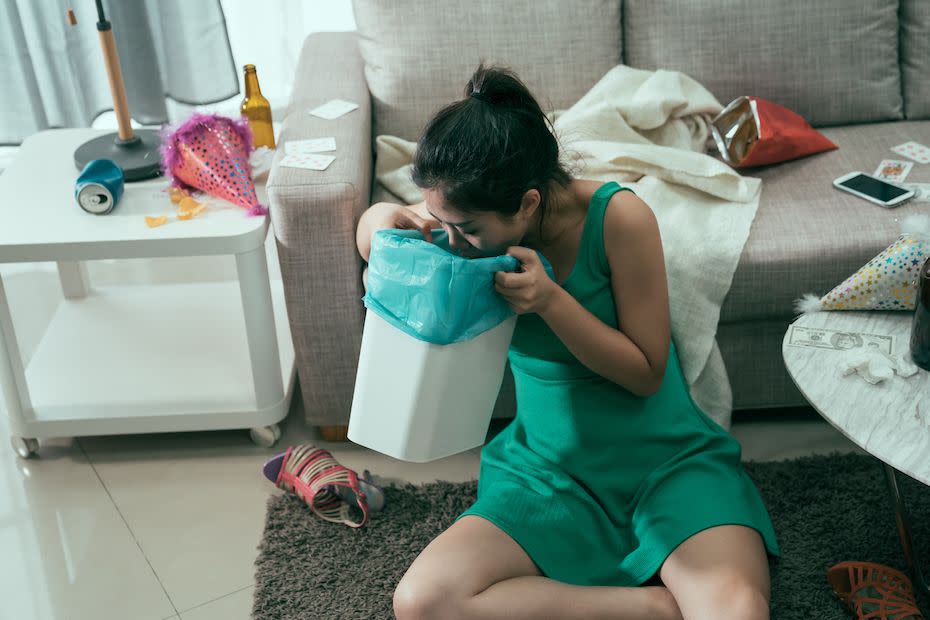Freshers Week survival guide: Your health questions, answered by an expert

If you're heading off to university for the first time this year, you're probably feeling a mixture of excitement – goodbye living with your parents! – combined with some serious new-kid-at-school nerves. Of course, that's totally expected.
Another thing you'll be expecting is one helluva time during Freshers Week too, and you've probably got your sights set on a lot of drinking and a lot of hooking up. Hey, you do you! Or don't! Remember, it's important that you're not pressured into doing something you're not comfortable with.
Some universities in the UK have already started their Freshers Week, but for most, the rite-of-passage is yet to begin. With that in mind, we spoke to pharmacist Melanie King at Pharmacy2U to find out how to survive your very first Freshers Week...
Freshers Week health survival guide
What are the most common illnesses that students get during freshers week?
"Halls and shared housing are great for making friends and being at the centre of the social scene. However, living close to lots of new people means viral infections can spread easily," King tells Cosmopolitan UK, adding that: "Navigating the stress and emotion of being away from home for the first time can also weaken your immune system."
The most common illness that new students find themselves picking up at university is "Freshers flu", which King explains is a "generic, catch-all term used to describe general cold and sore throat type illnesses that many students experience during their first few weeks of university."
If you think you've caught a case of "Freshers flu", there's no need to stress. "Often 'Freshers flu' will clear up on its own," the expert says. "But ensuring you get plenty of sleep, eat well and drink plenty of water will help you feel better as soon as possible."

As for other nasties floating around during Freshers Week, King notes that: "Glandular Fever can also be common among students and can take more of a toll on your body. It's transmitted through saliva, so coughing and sneezing can spread it, as can sharing cups, cutlery or kissing." It can take some people up to three weeks to fully recover, and others may feel extreme tiredness for months after.
What are the main signs and symptoms to look out for when it comes to most common illnesses?
"Freshers flu" symptoms are pretty easy to spot, and King advises they can include: shivering, a fever, a dry cough, sneezing, headaches and general grogginess.
Symptoms of Glandular Fever are somewhat similar but more serious, these include: a very high temperature/feeling hot and shivery, a severe sore throat, swelling on either side of your neck (swollen glands), extreme tiredness or exhaustion and tonsillitis that is not getting better.
Can excessive drinking make you more susceptible to illness?
Although Freshers Week is predominantly about meeting new people and settling into your student digs, it's also about partying. Lots and lots of partying, to be precise. But, whilst the thought of non-stop nightclubbing may sound like the stuff of student dreams, all that drinking can take a toll on your health.
"The excitement of newfound freedom and indulging in lots of social events can sometimes cause students to overdo it when it comes to alcohol consumption," King points out. "However, excessive drinking can damage your health, personal safety and academic performance."
Not only that, but in the long run, "regular binge drinking episodes can cause liver disease and heart and kidney problems."
So, how much should you be drinking per week?
King reminds us that the NHS recommends a limit of 14 units of alcohol per week, which is around 10 small glasses of wine or six pints of beer.

How can you be mindful of your drinking during Freshers Week?
If you're considering cutting back on your alcohol consumption during Freshers Week, or just want to be more mindful when you are drinking, King has plenty of suggestions. "Drinkaware has some great tips for new students," she tells us. This includes "eating a substantial, carb filled meal and drinking plenty of water before you drink, only taking cash so you can limit the amount of drinks you can buy and making sure you rehydrate when you get home from a night out."
And that's not all! "You can also plan some alcohol-free days with the NHS Drink Free Days app. It gives you reminders and tips and celebrates your milestones," the expert adds.
How can you stay safe during sex, particularly when getting drunk often?
Moving to university means having a lot more freedom than you did at your family home. But, if you do decide to get down to it at university, it's important to keep your sexual health in check.
"Alcohol can affect your judgement and also make you easy to influence," King says. "This means you might end up doing things you regret, including taking part in unprotected sex. This can lead to unwanted pregnancy and potentially contracting sexually transmitted infections (STIs)."
Make sure you've had a full STI test and get the all clear before term starts, the expert recommends, adding that putting a reminder on your phone to book your next appointment is a good way to go.
"If you're off out for the evening, it never hurts to carry a condom in your purse, just in case!" King advises, reminding us that: "The contraceptive pill does not protect against STIs."
If you are on the pill though, the expert stresses that "if you're sick within three hours of taking the combined pill or within two hours of taking the progestogen-only pill, your body probably won't have had a chance to absorb it."
As for what to do if you are, err, sick within these timeframes, "you should take another pill right away, and as long as you are not sick again, you will still be protected against pregnancy."
If you are sick for longer than 24 hours, "you should consider those as days you have missed your pill, so using other forms of contraception will ensure you are protected and give you peace of mind."
What are the most important things health-wise to be conscious of during sex?
"Dealing with an unplanned pregnancy or an STI while at university can be an incredibly stressful experience, so make sure you have proper contraception sorted," King recommends. "Your nearest sexual health clinic can provide free condoms (the only form of contraception that protects against STIs)," she adds, noting that: "Females may also want to discuss additional options such as the pill, patch, coil and injection."

Many universities have a sexual health clinic on campus, which is a great resource for information, and there are also some helpful online resources, websites the NHS and Sexwise.
And what should you do if you've had unsafe sex and you're worried about an STI or pregnancy?
Mistakes happen, and that's okay! The important thing to remember is that if you have had a slip-up, you then prioritise your health and safety as quickly as possible. "If you've had unprotected sex, you should visit your GP or a sexual health clinic," King says. "These are located across the UK (your university may even have one on campus), and they provide a range of NHS services, including the testing and treatment of STIs, contraception, free condoms, pregnancy testing and sexual health advice."
There's also ongoing measures you should be taking if you're sexually active, which include having regular STI tests to prevent spreading infections. "There's no need to be embarrassed, nobody will judge you, and early detection and treatment of STIs minimises long term health risks," King reminds us.
What are the first aid basics to have at your student accommodation?
Alcohol and sex aside, there are other ways you can look after your health whilst at university. "It's a good idea to put a kit together of basic health supplies you might need during your time at university," King says. "This could include painkillers such as paracetamol and ibuprofen, cold and flu medication, rehydration sachets, antiseptics wipes, heat packs, cold packs, plasters and tweezers."
So, there you have it! Happy Freshers Week, one and all...
This article is not intended to be a substitute for professional medical advice or diagnosis. Always seek the advice of your physician or other qualified health provider with any questions you may have regarding a medical condition.
You Might Also Like

 Yahoo Movies
Yahoo Movies 
